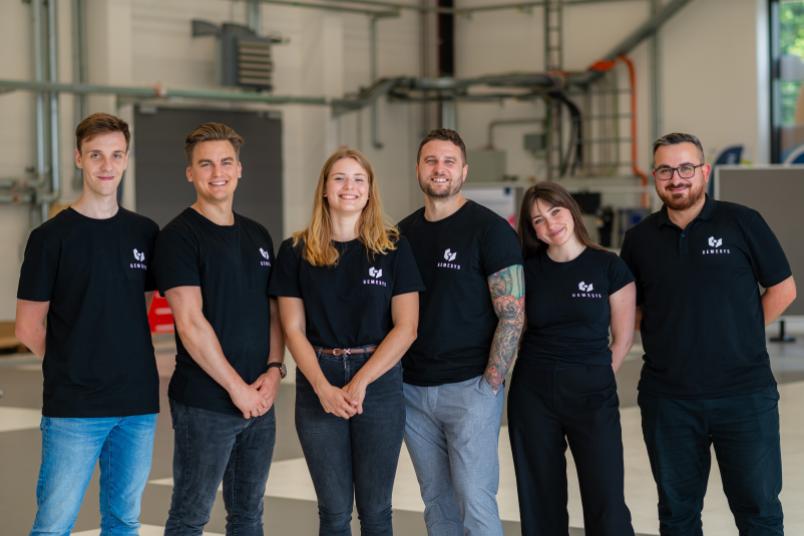
Start-up How the human brain is revolutionizing AI hardware
GEMESYS is developing a revolutionary chip design that mimics the information-processing mechanisms of the human brain – now they are nominated for a special title.
OpenAI’s ChatGPT-3 guzzles millions of euros every week; Tesla’s Full Self-Driving AI takes more than a month to train. The biggest obstacle so far? “The current hardware on which AI runs”, says Dr. Dennis Michaelis, one of the founders of GEMESYS. The AI hardware start-up is one of the top 5 start-ups of the Worldfactory Start-up Center (WSC) at Ruhr University Bochum. As one of 25 nominees, the start-up will present its groundbreaking chip design at the Falling Wall Science Summit in Berlin on the 7 November 2023.
Start-up uses brain as template
GEMESYS is working on a unique, bio-inspired computer chip that will make AI hardware faster and more energy-efficient, thus overcoming bottlenecks in information technology. “The human brain is a million times more efficient than the best AI chip on the market today”, says Michaelis from the Chair of Digital Communication Systems. Together with his team, Michaelis aims to replicate the information-processing mechanisms of the human brain in electrical circuits. By combining information-processing and storage units, the GEMESYS chip is based on a completely new computer architecture. This enables a significantly better computing performance, increased energy efficiency and higher data security.
Making AI technology accessible
What makes the GEMESYS chip so special is that the new architecture facilitates the training of artificial intelligence ”on site” instead of in the cloud; it also promises offline operation and lower latency. “Our chip will be so small and compact that we’ll be able to bring powerful AI to any end device,” says Michaelis. This is how the team aims to bring artificial intelligence closer to users, in the hope of democratizing the technology. “If everyone has access to a little brain in their pocket, the quality of life in society will improve significantly,” adds Michaelis. Potential applications for the chip range from robotics to satellite communications, drug development and nuclear fusion. The first prototype is expected to be ready in about one to two months.
Falling Walls honors breakthroughs
GEMESYS is among the 25 nominees who will be allowed to present their innovation to an international audience at the Falling Walls Science Summit on 7 November 2023 in Berlin. “The Falling Walls Science Summit is a three-day congress, with high-profile international guests from art, culture, politics, business, and science, including Nobel laureates. The aim is to put the spotlight on people who, through their work in very different fields, are moving humanity forward and breaking down metaphorical walls. It’s a great honor for us that the expert jury has picked us as one of the most promising teams out of hundreds of applications,” says Michaelis. The AI hardware start-up is now in the running for the title of “Science Breakthrough of the Year 2023” in the “Science Start-Ups” category.
Growing international success
The current nomination at Falling Walls is not the only sign of the start-up’s success. This year alone, GEMESYS won several major awards, including two out of five investor awards at the Deep-Tech Momentum, one of the most renowned European deep-tech competitions. In the pitch competition, the team triumphed over around 60 other European start-ups. “It’s a great honor to compete against so many outstanding and ambitious European startups,” Michaelis admits proudly. The start-up also won the “Gründungspreis+” in the nationwide “Gründungswettbewerb – Digitale Innovationen” of the Federal Ministry of Economics and Climate Protection (BMWK).
Top research meets excellent start-up support
GEMESYS is one of the top start-ups 2023 of the Worldfactory Start-up Center (WSC) at Ruhr University Bochum. Here, innovative ideas inspired by top-level research meet an excellent start-up center. “The Ruhr University’s excellent research and wide range of courses provide a good opportunity to find the necessary technical and non-technical expertise that an up-and-coming start-up needs,” says Dennis Michaelis. In addition to expert advice, workshops and competitions, the WSC offers the Makerspace, one of the largest university teaching and experimental spaces in Germany.
GEMESYS is also supported by EXIST research transfer – a funding program initiated by the Federal Ministry for Economic Affairs and Climate Action. More than 3 million euros in funding shows that the German government is aware of the political impact of both the start-up and high-performance AI hardware.
The Worldfactory Start-up Center